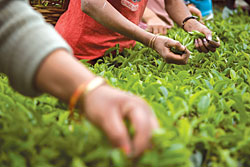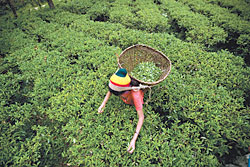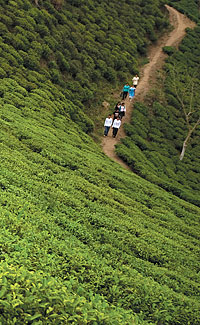|
|
Tika Basnet's hands move with speed and dexterity over the tender shoots of the tea bushes. She gathers clumps of leaves and casually flicks them into the doko on her back. Tika and her husband grow tea on their five hectares of land at Nepaltar in Ilam.
In the past ten years as Ilam's tea has won fame and recognition around the world, families like the Basnets have benefited as they switch from subsistence farming to tea as a cash crop.
Today, tea gardens surrounding Ilam bajar stretch downhill through the valley to the river, draping the hillsides with an emerald carpet. The tea industry now directly benefits 7,000 families and tens of thousands of people have benefited from investing in their own private tea estates. There are more than 100 private plantations at Nepaltar alone.
With Darjeeling across the border, Ilam has just the right soil and climate conditions for tea. But it hasn't always been rosy; Ilam still suffers from an identity crisis and it has been difficult to penetrate an increasingly fussy international market.
|
|
A few years ago, 30,000kg of tea was sent back from Mumbai because the chemical content was too high. "But that was a blessing in disguise because today, farmers and tea companies have switched to organic tea in a big way," says RC Nepal, manager of the Himalayan Shangri-La Tea.
Initially, local farmers didn't want to stop using chemicals but they've come around. "Although chemicals make the tea grow faster, I've realised it's healthier to use organic fertilisers," says Krishna Bahadur Basnet, a local tea farmer who grows tea on 6.5 hectares. "Since I stopped using chemicals, I've seen leeches, beetles and snakes in my garden again. Now I know that the chemicals were killing them."
Many farmers are now ardent supporters of the organic cause. "They said I should stop selling chemical fertilisers," says Gobinda Katuwal, proprietor of the only shop in Nepaltar that still sells chemical fertilisers.
Factories periodically send inspectors to check private gardens for traces of chemicals, and if they find any, stop buying from that garden. "Our target markets are in Europe, mostly Germany and France," says Nepal. "These buyers are really strict about chemical residues."
|
|
Most of the tea produced at Shangri-La is still sold in India as Darjeeling tea. But 10 percent makes its their way to Europe where the Ilam brand is gaining recognition and this volume is expected to grow as European importers begin to trust Ilam's organic leaves.
Nepal exported 833.5 tons of tea worth Rs 98,347,000 in 2006, up from only 83.1 tons in 2002. Ilam's tea is young and fresh, which is why it is being eyed from across the border, say locals at Fikkal. They tell of trucks and donkeys crossing over to Darjeeling in the wee hours.
Less than three percent of tea produced at the Shangri-La factory is consumed domestically. "Nepalis prefer Jhapa CTC tea," says Nepal. The organic Ilam tea is not strong and is best for those who drink tea without milk.
Darjeeling is still an international brand, but experts here say the plantations across the border are now old and have lost their flavour because of the long-term overuse of chemicals. Most of Ilam's gardens, in contrast, are less than 15 years old and in their prime. This is why Darjeeling producers have started buying Ilam tea for their blend, which is an irony because many of Ilam's gardens were grown from cuttings brought over from Darjeeling.
"Going organic is the only way to preserve our livelihood," says Tika Basnet, "and if it helps the environment then all the better."
Where to get your cuppa:
Trends and Tastes, Hotel Narayani Complex, Pulchok
Nepal Tea House, Basantapur
Everest Tea House, Basantapur
One leaf & one bud
|
|
"We need to try out new things with our tea if we want to compete with Darjeeling," says RC Nepal, of Himalayan Shangri-La Tea Factory. For the last two years the factory has been producing a new kind of white orthodox tea. A tea connoisseur's dream, it is drawn only from the best flushes, using one leaf and one bud. The white orthodox is packed with flavour, and also rich in anti-oxidants, anti-viral and anti-bacterial elements. The product currently sells for Rs 1,000 a kg in Nepal. "But we still haven't perfected the technique yet," says Nepal. "Makaibari in Darjeeling has been able to sell white tea for Rs 40,000 a kg. We need to develop our brand so we can catch up."






